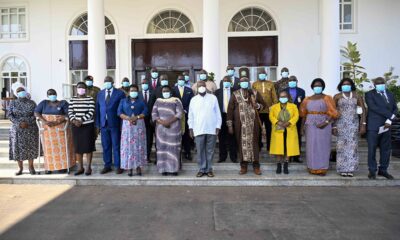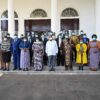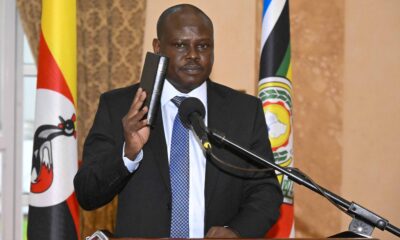News
Exploring the Intersection of Religion and Family Planning: Seeking Clarity
As Uganda moves to sustain its demographic dividend (DD), one of the biggest challenges faced is a low prevalence of family planning (FP) and a high young population. With slightly over half of its population (48%) under age 15, Uganda ranks among the countries with the most youthful demographics globally.
Experts have identified a number of reasons as to why family planning prevalence is low, such as culture, and religion. Dr. Phillip Atidra, head of Reproductive Health Uganda (RHU) in Arua City, notes that many individuals, particularly Catholics and Muslims, cite religious beliefs as a reason for having larger families.
But, what does religion say about family planning?
When Immaculate (not real name as the source was not comfortable sharing her identity) got married, the priest informed her and her husband that their purpose was to procreate and explained that the Roman Catholic Church does not endorse the use of modern or artificial contraceptives.
She had hoped that they would have at least four children since her husband is a Boda Boda rider and she is a housewife. The couple resides in Kabujogera, Kitagwenda district. At 38 years old, Immaculate has 10 children, with the eldest being only 16. She is concerned that regardless of their efforts, their children may not have promising futures due to the mismatch between the size of their family, the limited land they own, and her husband’s earnings of less than $5.
“I am a believer. In fact, I am a chairperson of the Catholic Charismatic Renewal group at the Parish and when the priest told us that marriage is sacred and that we were to use it for procreation, we thought it was going to be easy. The priest even told us that the use of condoms was for only if one of us suspected that they had a sexually transmitted disease” Immaculate narrates.
The Catholic Church’s teaching is against all forms of artificial birth control. It only approves the natural family planning methods such as abstinence from the sexual union during the ovulation period.
Natural family planning (NPF) or “periodic abstinence” uses methods that rely on observation of the naturally occurring signs and symptoms of the fertile and infertile phases of a woman’s menstrual cycle.
Couples seeking to avoid pregnancy through NPF abstain from intercourse and genital contact during the fertile phase of the woman’s cycle. NPF does not require the use of drugs, devices or surgical procedures to be effective in avoiding pregnancy.
Pope Paul VI wrote “if there are well-grounded reasons for spacing births, arising from the physical or psychological condition of husband or wife, or from external circumstances, the Church teaches that married people may then take advantage of the natural cycles immanent in the reproductive system and engage in marital intercourse only during those times that are infertile…” (Humanae Vitae, 16). NPF or “recourse to the rhythm of the cycle” as John Paul II calls it, is open to love and life.
According to Fr. Darius Magunda a tutor at St. Mary’s National Major Seminary Ggaba, the Church opposes artificial birth control because it believes that sexual union should always remain open and free for procreation.
“Some liberal views by Catholics call for exceptions in certain circumstances such as the need to prevent a sexually transmitted disease and also to avoid too many children that may not be properly taken care of,” Fr Magunda says.
The Catholic Church supports and approves of NPF because it respects the ends of marriage (unitive and procreative). From the beginning of creation, God designed marriage as an intimate partnership of life and love between a man and a woman for the whole of life (Gaudium et spes, 48; Code of Canon Law, n. 1055).
Fr. Magunda says that during couples counselling that leads to the wedding, a man and wife are taught to know that marriage was willed and instituted by God and that it is indissoluble (can’t be separated), that love is the most important virtue in marriage. Where there is love there is understanding, tolerance, perseverance, mutual respect, forgiveness, humility and sacrifice.
“We teach them that the parents’ duty and obligation are to properly bring up their children in body and spirit, that a family of man and wife and children mirrors the bigger family of God, the Church and that the love of husband and wife is like the love between God and his people; between Christ and the Church,” he says.
Islam
Islam too does not support the use of modern contraceptives. According to Sheikh Kassim Kayira an Islamic scholar, Islam only supports the use of natural family planning like withdrawal and in some cases condoms.
Kayiira says that it is strictly forbidden for a woman to just swallow pills in order to stop having children. He explains that where husband and wife choose that they want to use condoms in order to space children, then it is allowed within Islam.
“However, spacing of children as an element of family planning is allowed in Islam, using the rightful measures. Condoms can be used between husband and wife, not between boyfriend and girlfriend because Islam does not allow sex before marriage,” he says.
He cites health issues as some of the reasons they do not allow women to use pills. “Given their effect on health later on in life, pills are detested. But, if they are the only option available, there might be little room to allow that. But given the experience that we have seen with some women even developing cancer, they are strictly forbidden or Haram,” Kayiira explains.
According to Kayiira, during the time of the Prophet the best method used was withdrawal, though it is hard and not for everyone.
Islam also advocates for breastfeeding as a method of birth control. The Quran specifies a duration of two years for breastfeeding. Consequently, if a child is breastfed for two years, it naturally helps in spacing births. It is believed that during breastfeeding, the likelihood of conceiving decreases.
However, women who have complicated cases like giving birth by C-section may be excused to use modern contraceptives to avoid getting pregnant before their wounds from the previous birth heal.
Meanwhile, Pentecostal churches also provide marriage counselors who offer guidance to married couples. Additionally, pastors preach abstinence from sexual activity until marriage.
However, those who are already married, are advised to use condoms in order to space the children.
According to Pastor Stephen Jjumba of Jabez Foundation Ministries, Mutundwe, the counsellors recommend that married couples use the withdrawal methods and observe safe days in order to avoid unplanned pregnancies.
“The marriage counsellors have some birth control measures they advise couples to use. And these are; withdrawal and safe days. The counsellors teach women about their calendars and how to calculate safe days. They also advise them to use condoms until they are ready to conceive,” Pastor Jjumba says.
For women like Immaculate, who have already had 10 children, there may not be a straightforward solution to their challenges except for disregarding their religious beliefs and considering the use of modern contraceptives.
For women like Immaculate, who have already had 10 children, there may not be a straightforward solution to their challenges except for disregarding their religious beliefs and considering the use of modern contraceptives.
In order for Uganda to sustain its Demographic Dividend and achieve a balanced economy, the government and other stakeholders must collaborate with religious leaders to chart a path forward that benefits the entire society.












































